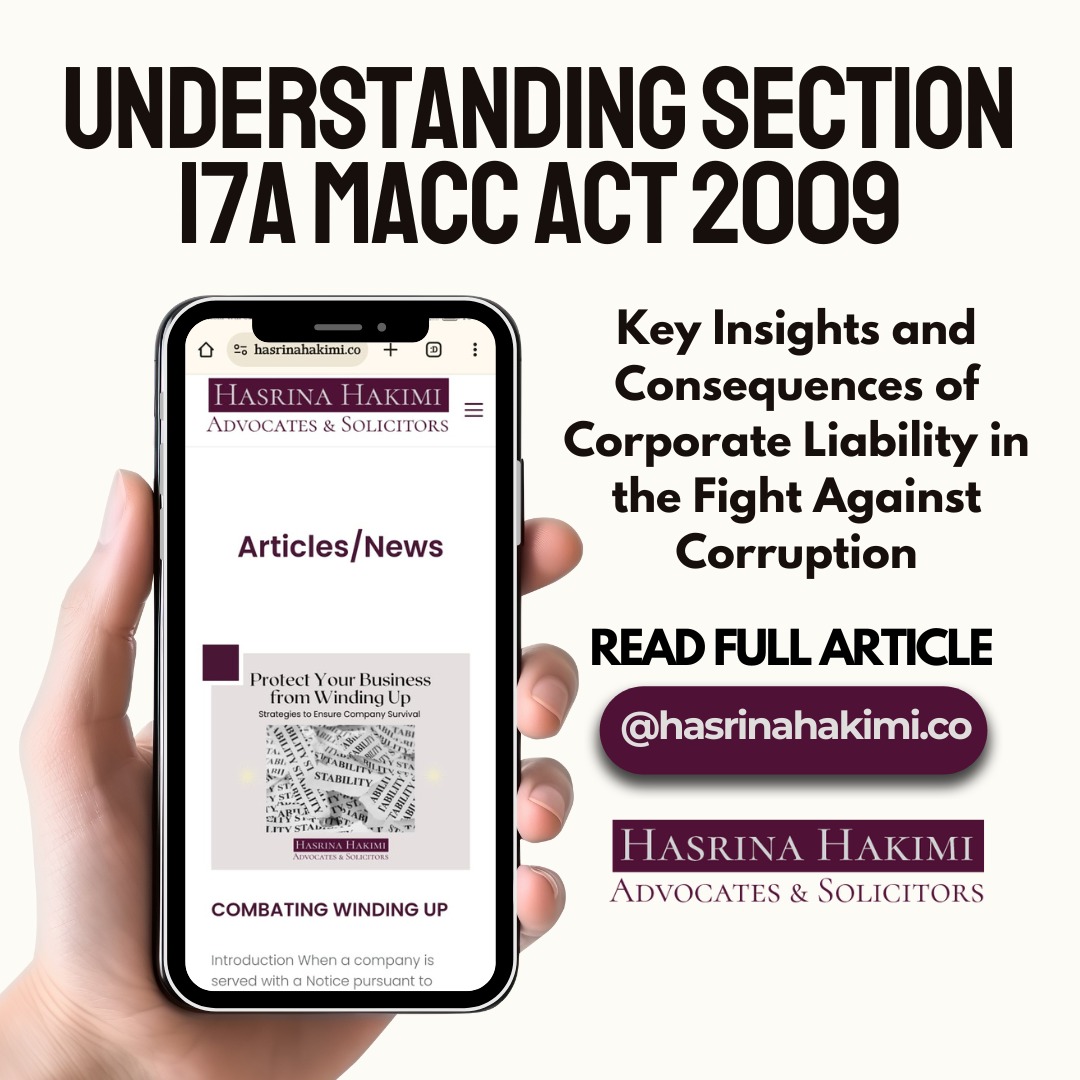Section 17A of the Malaysian Anti-Corruption Commission Act (MACC Act) 2009 represents a significant development in the nation’s effort towards combatting corruption that is prevalent amongst commercial entities and their interactions with public officials.
It is a newly amended provision through the Malaysian Anti-Corruption Commission (Amendment) Act 2018 which was gazetted on 4 May 2018 and duly enforced on 1 June 2020. This gave corporate entities a two (2) year grace period to make appropriate preparation in implementing adequate procedures within their system to safeguard themselves against corporate liability.
17A. Offence by commercial organization.
(1) A commercial organization commits an offence if a person associated with the commercial organization corruptly gives, agrees to give, promises or offers to any person any gratification whether for the benefit of that person or another person with the intent:
(a) To obtain or retain business for the commercial organization; or
(b) To obtain or retain an advantage in the conduct of business for the commercial organization.
Under this provision, commercial organizations can be held liable for corrupt practices committed by their employees or associated persons, if such acts are performed in the course of their duties or for the benefit of the organization. It is a strict liability offence.
However, an available defence that may be utilised by corporate organizations in defending themselves against charges of corruption are by proving that they have adequate procedures in place to prevent such corrupt activities from happening in the first place. This is known as the “adequate procedures defence”. It is a practice demonstrated by commercial organizations to prevent any corrupted acts from being instituted by any persons associated with them.
Whilst the MACC Act 2009 does not prescribe specific procedures which tantamount to the said defence, it emphasises that the measures undertaken should be proportionate to the risks of corruption faced by the organization. The National Centre for Governance, Integrity and Anti-Corruption (GIACC) under the MACC had issued the Adequate Procedures Implementation Guideline to assist commercial organizations in developing the said procedures. In brief, here are some of the adequate procedures that may be undertaken by an organization.
(1) Risk Assessment
The organization may regularly conduct risk assessments. This can be exercised by conducting interviews amongst the employees, stakeholders and management as well as reviewing company policies and identifying inherent risks within the company. All data should be well documented and reviewed in improving the company’s existing procedures to develop a thorough in-house anti-corruption programme.
(2) Due-Diligence
The organization could also conduct sufficient due diligence exercises on third-party entities attached to the company, i.e, vendors, agents, contractors and sub-contractors et cetera in ensuring that they are not breaching any policies or engaging in any corrupted activities. It is crucial to monitor any suspicious behaviour that may be happening linked to / within the company.
(3) Speak-Up Culture
Companies should also be proactive in implementing and encouraging a speak-up culture within its entity. For instance, implementing a whistleblower programme which encourages its employees to speak up in addressing their concerns or reporting corruption complaints to a neutral committee that has been set up by the company to address and handle the said matters.
To conclude, Section 17A MACC Act emphasises the importance of corporate governance and the implementation of a robust anti-corruption compliance programme within an organization. It highlights Malaysia’s approach in moving towards holding corporate companies liable and ensuring that transparency and accountability are values cultivated within the entity. Strict penalties and sanctions may be imposed on any commercial organization found liable as it may be subjected to a fine (not less than ten (10) times the value of the gratification) or RM 1,000,000.00, whichever is higher, or imprisonment for up to twenty (20) years, or both.
Disclaimer: This article is for informational purposes only and does not constitute any legal advice. If you have any questions or require further information on this matter, please do not hesitate to contact us directly.
